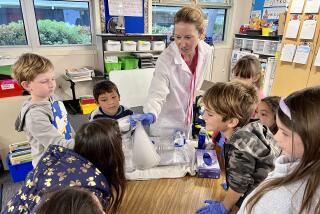AIDS Education at Schools Is Crucial : Only a Third of O.C. Parents Take Up the Life-or-Death Matter With Their Children
- Share via
How to teach people about AIDS prevention has been a sensitive topic, partly because a primary means of transmission is through sexual contact.
In this country, most people with AIDS are gay men or drug addicts. But as Acquired Immune Deficiency Syndrome has spread to include heterosexuals who do not use drugs, and as the numbers of those infected by the virus causing AIDS has increased, its importance as a health issue has attained increasing prominence.
Poll results released this month showed how widespread the concern about AIDS has become in Orange County. More than 40% of those questioned said they knew someone who had contracted the disease, far higher than the 25% figure in a nationwide poll three years ago. Nearly three-quarters of the Orange County respondents said they thought AIDS was a “big problem” in the United States today; many thought it likely the disease “will become widespread among the public at large in the years ahead.”
In a county known for its conservatism, three-quarters of the residents told UC Irvine pollsters they approved starting to teach children about AIDS and other sexually transmitted diseases in the early grades. Nearly as many thought AIDS education programs in junior high and high schools should include instruction about safe sex practices and the use of condoms, as well as sexual abstinence and the importance of remaining celibate until marriage.
The need for AIDS education is clear. Despite their concerns, only about one-third of the parents had discussed AIDS prevention with their children in the past year. That lack of communication increases the burden on schools to provide accurate information. California wisely has required public schools to offer a basic AIDS education program at least once in middle school and once in high school. The curriculum includes information on how the disease is spread and the importance of abstinence as the best protection.
Nationally, that lesson does not seem always to sink in. Two years ago the Centers for Disease Control found in a survey of high school students that many were ignorant of the disease or were ignoring the risks.
The UCI poll showed that Orange County residents correctly believe education is an important part of dealing with a deadly disease. More communication at home would help, but schools will have to continue to make AIDS education a part of the curriculum.
More to Read
Sign up for Essential California
The most important California stories and recommendations in your inbox every morning.
You may occasionally receive promotional content from the Los Angeles Times.













